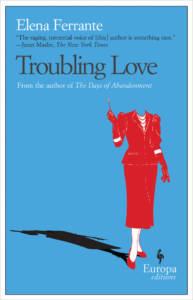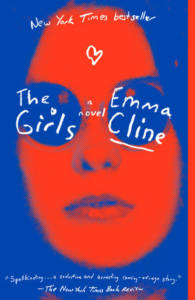Ah, July Friday Reads, where the temperatures are high and the stakes are even higher. This month, read alongside Issue 13 contributors and our managing editor as we face devastating epidemics, maternal death, and the eternal angst of feminine adolescence. Though each book finds a uniqueness in its approach to calamity, each work uses the minute details to capture the universal perils of love, loss, and loneliness.
Recommendations: Troubling Love by Elena Ferrante, The Girls by Emma Cline, and Station Eleven by Emily St. John Mandel.

Troubling Love by Elena Ferrante, recommended by Megan Fernandes (poetry contributor)
I’m a little embarrassed that it’s taken this long to finally read Elena Ferrante’s 2006 book, Troubling Love, about a 40 something woman’s investigation into the mysterious death of her mother, but as usual, I’m completely riveted by the torrential pace and adrenaline of Ferrante’s prose. The book reminds me of reading the noir-ish short stories of Jorge Luis Borges with its labyrinthine plots, detective voyeurism, and shadowy shape-shifting figures just moving out of sight. Our unruly feminist anti-hero, Delia, is kind of a mess and holds the past of her mother, Amalia, in a mythological light. She chases the specter of her mother’s laughter through lingerie stores, beach towns, and hallucinations of her childhood to understand how her mother’s joyful and sometimes careless behavior ignited a brutal jealousy in the men around her. But as Delia learns, that possessiveness is not uncomplicated and she feels betrayed by the ways in which her mother (and she, herself) become complicit in her own demise.
The reveals of Ferrante’s stories are always more and less dramatic than I think they will be. She can manage to transform a child’s weekday fever into something equal to the terror of war (The Days of Abandonment) or illustrate the life-long consequences of a childhood lie to epic proportions. I love the way Ferrante throws her reader into conflict on the first page and how she so aptly describes the claustrophobia of certain kinds of kinship between mothers and daughters, between sisters, between widows, between neighbors. What can I say? I love the way Ferrante made me run through this book. She wastes not a page. This is a book of heart-breaking admissions.

The Girls by Emma Cline, recommended by Laura Winther Galaviz (fiction contributor)
In the first year of a fiction MFA, the question I was most commonly asked – the question that scared me because I couldn’t answer it – was “Why do you write?” I wrote because I wrote, I thought. But the older I got, the clearer the answer became – I wrote to understand the perspectives of those I couldn’t comprehend, to diminish the otherness of others. Like taking apart a clock to see how the parts came together, there was immense comfort in putting myself into a character confusing to me, in speaking directly in their voice to see what they might say, and to find their humanity in that exercise. This is the same reason I picked up Emma Cline’s The Girls. The novel is written from the perspective of Evie, now a grown woman, who came dangerously close to joining a cult, unnamed but clearly inspired by the Manson family.
And so I came for the cult, but I stayed for the insights. Cline’s depiction of and insight into the mindset of preteen girls – the loneliness, insecurity, frustration – felt as clear and honest as the experience itself was twenty years ago. There is plenty of fiction that delves into longing between lovers, but I can’t think of another book I’ve read that discards that trope to focus on the desire and need for girls to connect with other girls, to find acceptance and family there. Any novel that can cast a Charles Manson-esque character second fiddle to the girls following him is doing hard, ground-breaking work.
The brilliance here is the slow progression of events. In the beginning, Edie is a normal 14-year-old girl with a best friend, headed to private school in the fall. And in the end she is bailing out of a mass murder moments before it happens. None of the steps in the middle feel weighted, though – it is simply one foot in front of the other, until she looks up and can’t figure out how she might have traveled so far from where she started. The way the most things happen. And, in the end, you feel that maybe it isn’t so hard after all, to get caught up in the unimaginable.

Station Eleven by Emily St. John Mandel, recommended by Emily Everett (Managing Editor)
There comes a point, when enough people have urged you toward a certain book, that you begrudgingly pick it up, prepared to be unimpressed. In the past few months this has happened to me twice, with two novels of a fictional future: Jeff VanderMeer’s Annihilation, and Emily St. John Mandel’s Station Eleven. Reading both in succession threw their differences into stark relief; the latter’s exquisite narration only highlighted the intimate, human touches I found missing in Annihilation.
Station Eleven begins with a devastating pandemic, rapid and almost inescapable, that obliterates nearly all of the world’s population. From there, characters and story weave in and out of the times before and after this event. There is so much about this story arc that could be cliché or dull, but Mandel avoids it by letting her wonderfully nuanced characters take the lead instead. The story is profoundly human, exploring the emotional truths revealed by the dramatic circumstance, rather than the circumstance itself. The perfect opposite, in my mind, to the sterility of Annihilation.
There are many studies of human nature in Station Eleven, large and small – our propensity for religious zealotry, for violence, for community, for remembering and preserving history, for valuing Shakespeare and art even when those things are impractical. I was particularly fascinated by Mandel’s look into grief and tragedy, and the effects of scope and perspective on how we experience it. Her characters struggle to understand their grief, or struggle to grieve at all, when their personal mourning for a lost brother, lover, or friend is dwarfed by the scale of loss all around them.



